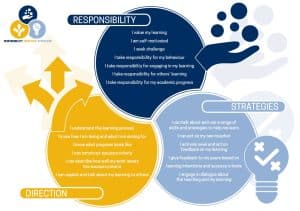Forest’s academic ethos is simple – we want pupils to master their subjects, develop their understanding of the metacognitive learning process (learn how to best learn) and, subsequently, grow into great life-long learners.
Academic mastery is about more than getting high grades; it’s about mastering the knowledge and skills of any given subject and seeing this as the real outcome of an academic education. We want our pupils to leave Forest with both excellent results and the crucial mindset that we learn for the intrinsic value of self-betterment.
The skills and dispositions of a great learner are articulated in our Forest Learner framework. We want pupils to know and believe that anyone can be a great learner if they:
– TAKE RESPONSIBILITY FOR THEIR LEARNING
– KNOW WHERE THEY ARE GOING
– KNOW HOW TO GET THERE
These are summarised in the strands of the Forest Learner – Responsibility, Direction, Strategies. Being a great learner is not simply about character traits such as grit and resilience. It’s about understanding the learning process and using the most effective learning strategies and techniques which can be taught and practised.
Our approach means that pupils will have the foundational knowledge to reach the highest levels of conceptual thinking in the Forest curriculum whilst also being equipped to approach any new learning with the confidence of expert learners.
This approach, unashamedly centred on academic excellence and intellectual growth, emphasises the type of teaching and learning which engenders ‘cognitive wobble and conflict’, drags pupils into the ‘learning pit’ and encourages pupils to understand that risk, frustration and confusion are a normal part of the learning process. In the words of the distinguished Cambridge classicist Mary Beard, we want our pupils to ‘think until their heads hurt.’
The tenets and strands of the Forest Learner have been formulated through collaborating with -and reflecting on- the work and research of leading educationalists like Professor John Hattie, Dylan Wiliam, Daisy Christodoulou, Tom Sherrington and the notable cognitive psychologist Daniel Willingham. At the centre of our teaching and learning culture is the fact that Forest teachers are all evidence-informed practitioners engaged in ongoing reflection: their learning and development, like that of our pupils, is also continuing and, consequently, nobody is the finished product.
It is this mindset that enables our pupils, once they leave the White Gates, to not merely access the most demanding and rigorous universities, workplaces, and apprenticeships in the world but to thrive and succeed at them and to develop into life-long learners, irrespective of their chosen field.


